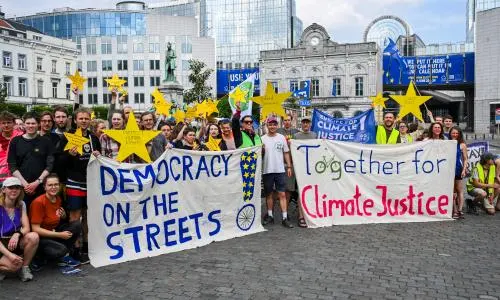According to what has been described as the most comprehensive analysis yet, more than $100bn of public money has been awarded to private investors in investor-state dispute settlement (ISDS) courts.
The controversial arbitration system which allows corporations to sue governments for compensation over decisions they argue affect their profits is largely carried out behind closed doors, with some judgments kept secret. But, according to a global ISDS tracker which launches today, $114bn has so far been paid out of the public purse to investors – about as much as rich nations provided in climate aid in 2022.
Available reports show that Fossil fuel companies have been by far the biggest beneficiaries of the corporate panels, raking in $80.21bn since 1998, according to the site. If current trends continue, at least another $48bn will be disbursed to settle cases currently under litigation, the research finds.
Lucía Bárcena of the Transnational Institute, one of the three groups that created the tracker, said: “Much like the British government paid slaveholders around £7tn in today’s money for ending slavery, the ISDS mechanism continues a system where corporate perpetrators get paid for finally doing the right thing, or at least for stopping with doing the wrong thing. This money should be spent on reparations for the innocent victims of global heating not handed out to the corporations responsible for causing it.”
Read also: Nearly half of journalists covering climate crisis globally received threats for their work
Tom Wills, who is the director of the Trade Justice Movement, which co-created the tracker, said: “The data backs up what we’ve been saying for years: ISDS is the secret weapon for fossil fuel companies against climate laws. Corporate courts are also used to threaten governments not to give in to popular local or national demands for climate action. This needs to be put to an end. The data shows reform is urgently needed.”
The ISDS system is reeling after EU countries last week withdrew en masse from the energy charter treaty, one of the most significant sources of investor-state claims.
But the mechanism remains a feature of most modern international investment agreements. It gives foreign investors the right to sue states for billions of dollars when their anticipated profits are affected by public measures such as green regulations.
Unlike national courts, ISDS tribunals allow investors to shape the panels that will hear their case, creating “obvious risks of bias, conflicts of interest, potential misconduct and other abuses of power”, according to a UN report last October.
The report found that the ISDS system had prevented states from taking climate action, even when it had been “necessary and foreseeable for decades”.
The tracker has a searchable archive of all 1,362 ISDS cases filed. It shows that investors have so far tried to claim $857bn from national governments, with 129 claims registered for $1bn or more.
Story was adapted from the Guardian.
